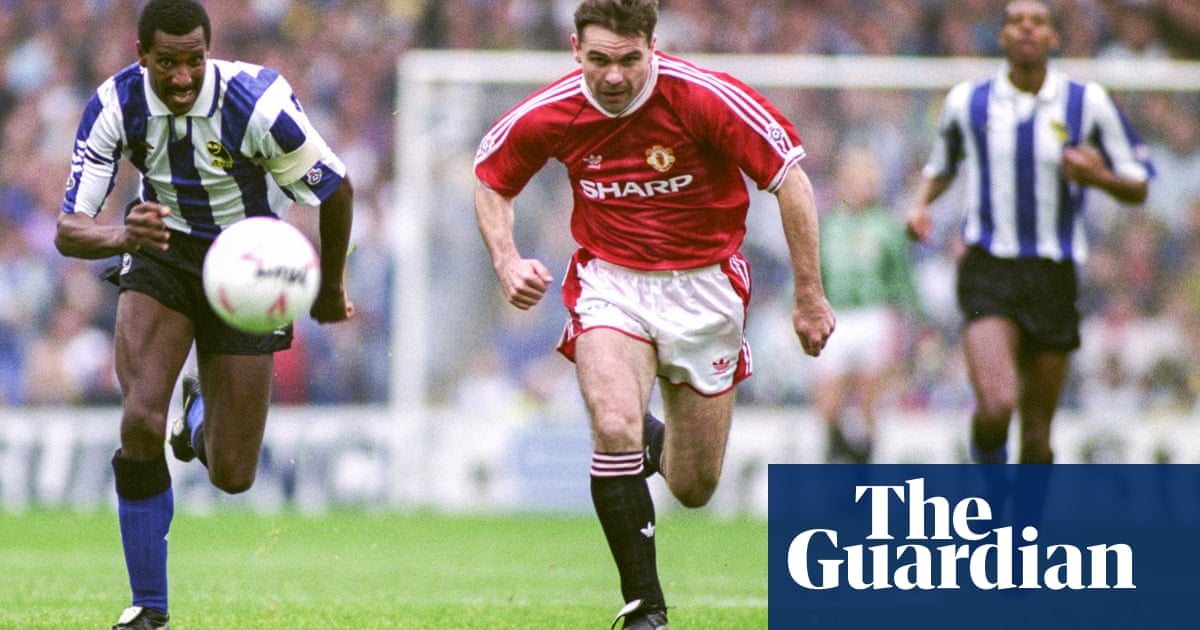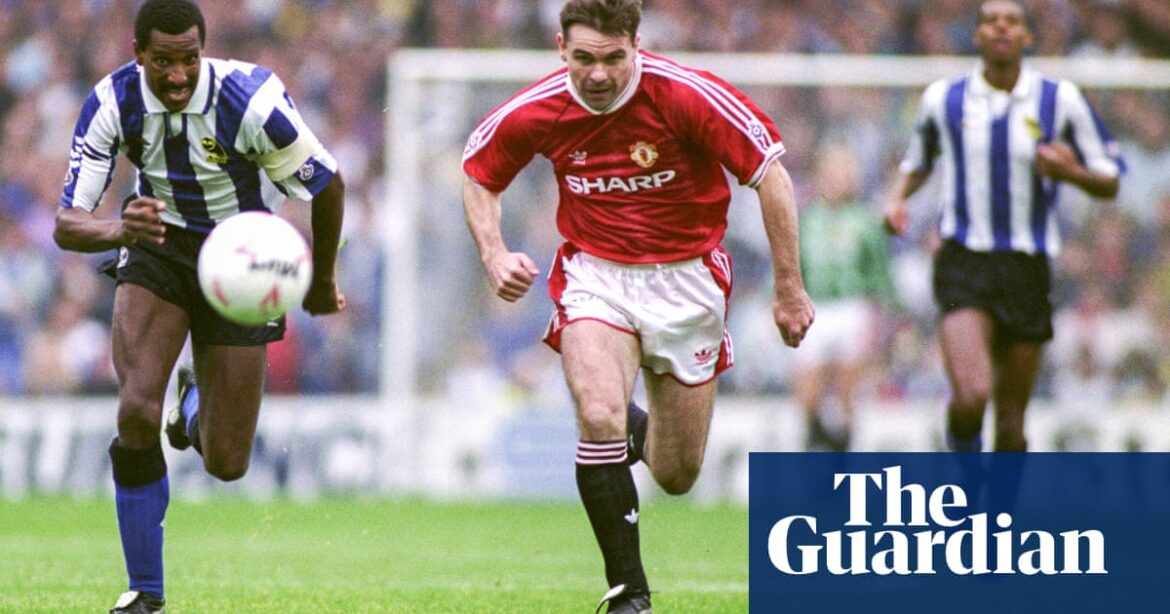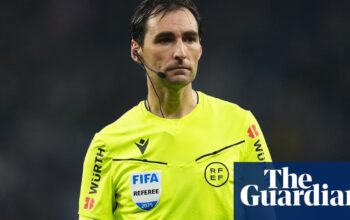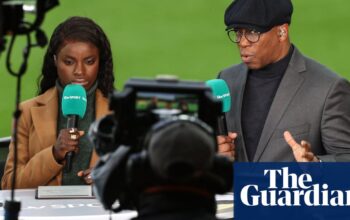
The reality of corporeality is a hard thing to process; just look at what we look like! But somehow, the agglomeration of weird shapes and freaky textures that comprises us responds to instructions from the quivering lump of jelly that really comprises us, and thus does football eventuate. Jesse Armstrong once said that if a joke isn’t working, one thing to try is sticking it an enclosed space so “the characters are up in each other’s physicality” and such is our beautiful game: a chaotic, hilarious gumbo of bodies controlled by brains that are fickle, stressed and distractible, having been socialised into the fanatical pursuit of an arbitrary aim to which has been ascribed inherent moral value.
Many of the most preposterous events I’ve seen in my life have been football-related: consider John Terry arranging for himself to take a Champions League-winning penalty and adjusting his captain’s armband en route, then slipping and crying, or Steven Gerrard coming on for his last appearance against Manchester United after spending the entirety of the first half being wound up by the away end, then getting himself sent off 38 seconds later. For balance, I was also at the Stadium of Light on the last day of 2011-12, but we all have our own favourites: those moments when players, asked to process footballing obsession multiplied by the human condition, simply cannot.
There is no greater tribute to this nexus than the goal scored by Brian McClair at Sheffield Wednesday in October 1991. At the time, United were in the process of getting good – they’d won the FA Cup in 1990 and the Cup Winners’ Cup the following season – with McClair a crucial part of that success. Arriving from Celtic in the summer of 1987, he immediately removed one of two much-discussed millstones: he became the first United striker to score 20 league goals in a season since George Best in 1967-68. And what goals they were! With the notable exception of a beauty at home to Chelsea, rarely if ever has anyone assembled a greater succession of scuffs, taps and nods, guzzled with consummate alacrity.
So now for the second millstone: United had not won the league since 1966-67. They’d capitulated when well-placed at various points since then but never under Alex Ferguson, whose second place in McClair’s debut season was really a third place, behind Liverpool and daylight.
Now, though, they were close to a proper team. Peter Schmeichel had arrived to shout at a settled back four featuring Paul Parker, Steve Bruce, Gary Pallister and Denis Irwin; in midfield, Paul Ince was a dynamic and deceptively lanky presence, succeeding Bryan Robson as the league’s best midfielder while the man himself handled vigilante justice and referee liaison; on the wings, it was two of Lee Sharpe, Ryan Giggs and Andrei Kanchelskis; and up front, McClair was partnered by returned hero, Mark Hughes.
So United arrived at Hillsborough – an 80s bogey ground – top of the table, leading Leeds by two points with a game in hand and the only team in the country still unbeaten. Wednesday, though, were handy. Just six months earlier, they’d beaten United to lift the Rumbelows Cup – a match also famous for Les Sealey’s flesh wound – which remains the last time a top division team lost a final to one from below.
Wednesday’s manager that day was Ron Atkinson who, when at United, saw his table-topping side concede a goal almost as beautiful as ours on the same day in 1985. But after leading Wednesday to promotion, he nipped off to Villa having promised to the contrary, so Trevor Francis came in and took the side to fifth in the table.
And what a squad Wednesday had, led by their captain Nigel Pearson – imagine, he’s mellowed with age! – while alongside him was the solidity of Roland Nilsson, the elegance of Viv Anderson and the Fantasy League legend Paul Warhurst. Then, in midfield, there was the the avant-garde grace of Carlton Palmer, the tiny-footed exuberance of the late Chris Bart-Williams and the improvisational invention of John Sheridan. These were skills he would later deploy to great effect as Stockport manager when, displeased by the work of the referee Eddie Ilderton, he told him: “You’re a fucking disgrace, you’re fucking useless, you’ve not fucking got anything right today, you should be fucking ashamed, you’re fucking shit, my kids aren’t going to get any fucking Christmas presents because of fucking you.”
Up front, meanwhile, Nigel Jemson partnered the long-time United target David Hirst. Indeed, Francis later earned the rich, rare reward of a hairdryer for his effrontery in refusing to sell him to United, Fergie eventually consoling himself with the Wednesday reject Eric Cantona.
And Hirst, who scored seven career goals against United, was quickly involved, diddling Robson and Parker with a lovely turn before botching his shot. But on 14 minutes he gave Wednesday the lead, a terrific header converting Nigel Worthington’s fine cross.
Robson then autographed Palmer’s leg – in fairness, he couldn’t really miss – before United quickly drew level. A dreadful back pass from Warhurst played in McClair, and the Mozart of the snot rocket eased a first-time finish past Chris Woods in front of a pogoing away end.
Then, five minutes later, it happens. Parker comes in on Hirst from behind and clips a pass infield under which McClair ducks, allowing Giggs, back to goal, to tee up Robson – bursting into the box like he’s on Baywatch – with a cute pass into stride. So far, so normal. But after Robson takes his touch, he swivels into a shot, the delay on which causes Anderson to slide in with nothing to block. Palmer, though, in the course of running past the ball, somehow does get in the road, the ball rearing up before Robson – the first to react – seeks to swipe square for McClair. But like a many-tentacled monster emerging from the ground, Anderson extends a telescopic limb while Nilsson, desperate, lunges towards his own net, diverting the ball away from the diving Woods and sending it dribbling goalwards with such emphatic, pathetic finality that both McClair and Irwin raise arms, anticipating an own goal of affirming ineptitude.
after newsletter promotion
Not so. Instead the ball hits the post, inciting Warhurst to leap into a look-at-me-maturely-taking-charge-of-this clearance, slamming fresh air into Row Z before colliding with Palmer, the two collapsing into the net like Laurel and Hardy performing Swan Lake. This allows McClair to caress home a long-range special from two yards, posing in front of the United fans to accept their acclaim following yet another delicious finish from the master marksman. “What an extraordinary mess!” enthused Alan Parry in commentary. “It’s 2-1 to Manchester United and have you ever seen a sloppier goal than that!”
There’s a truism in comedy that a good visual gag spanks a good verbal gag, so please now pause and enjoy the moment as nature intended it.
I can tell you what happened next if you like, in case you’re the kind of person who’d ask Joseph Heller about his second novel, or who hears Be My Baby and wonders about the B-side. United missed chances to forge further in front with Kanchelskis – wearing number eight – spurning the opportunity to open his account for the club. Then Jemson, on as sub, scored his first in the league for Wednesday, and when Schmeichel denied him with one of the great futile saves – he’d pull off an even better one against Arsenal in November 1998 – Neil Webb flicked on the resultant corner, as if doing so deliberately, for Jemson to head home the winner.
Eventually United tossed the title to Leeds, who won 6-1 when they visited Hillsborough a few months later. But just as that contest is now best remembered for Gordon Watson’s virtuoso dive, so McClair’s goal is eternal, existing beyond the confines of a game or season as paean to the absolute headfuck that is human existence.
Source: theguardian.com



